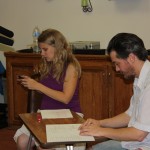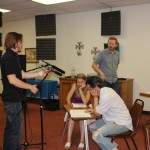There I saw Rosamond, Gregory’s sister with the goldred hair, cutting lilac before breakfast, laughing with the great unconscious gravity of a girl.
Rosamond is mentioned twice in The Man Who Was Thursday book. Once, right after Gabriel’s first debate with Lucien Gregory “the real anarchist” as he’s known. She catches his eye, and later asks him his advice on her brother’s anarchism. He says,
“Now, sometimes a man like your brother really finds a thing that he does mean. And it doesn’t matter if it’s only a half-truth, a quarter-truth, or tenth-truth; he will say it much more than he means– simply from the sheer force of meaning it.”
The second appearance is at the very end of the book, after everything has faded away into something else that we’re not quite sure what. Gabriel’s vision of her is the final line of the book. But Chesterton himself almost alludes to the idea that he wishes she could have appeared in more places in the story.
In the wild events which were to follow this girl had no official role to play. And yet, in some indescribable way, she kept recurring like a motive in music through all the mad adventures afterward, and the glory of her strange hair ran like a red thread through those dark and ill-drawn tapestries of the night.
Hence the idea that I would literally follow that vein– have Rosamond keep recurring like a motive in music. So I added two more scenes in which she appears and speaks to Gabriel. In the narrative, Gabriel rarely gets a moment to breathe and collect his thoughts. As he’s lost in this world where anything can take off its mask and become something else, Rosamond is the one constant. She has no agenda, she has no artifice, nor is she put off by Gabriel’s penchant for wit and melodrama. She has a genuine interest in who Gabriel is and cares about what he is going through. She also serves as a beacon, reminding him of what might be in store for him on the other side of this nightmare, should he ever wake up.
Adding words to Chesterton is one of the most harrowing and risky things I can do. It’s much safer to cut things and streamline the story and dialog without changing the nature of it. Adaptation is a special kind of art, and can be approached in many different ways, but the one thing I consistently believe is that the artist needs to find a way to personalize it to their own point of view. There are certain things in Thursday that speak to me, and ideas that I latched on to while reading it. These are the things I try to bring out in my radio adaptation.


